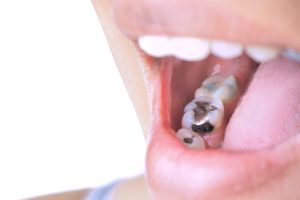Key Factors in Determining Eligibility for Dental Fillings
At Advanced Restorative Dentistry, we consider several crucial factors when evaluating whether dental fillings are the best treatment choice:
Severity and Extent of Tooth Decay 
Dental fillings are typically most suitable for addressing minor to moderate tooth decay. If the decay is caught early and only affects the outer layers of the tooth (enamel and dentin), a filling is often the most appropriate treatment. However, if the decay has progressed extensively and reached the inner pulp of the tooth, more comprehensive treatments such as root canal therapy or even tooth extraction may be necessary.
Remaining Tooth Structure and Integrity
For a dental filling to be effective, there must be sufficient healthy tooth structure remaining to support the filling material. The tooth needs to have enough strength and stability to withstand the forces of biting and chewing once the filling is in place. If a tooth is severely damaged or has lost a significant amount of its structure, alternative restorations such as dental crowns or onlays might be more appropriate.
Oral Hygiene Habits and Commitment
The success and longevity of dental fillings greatly depend on the patient’s oral hygiene practices. A good candidate for dental fillings should demonstrate good oral care habits and be committed to maintaining them. This includes regular brushing (at least twice daily), daily flossing, and using any additional oral care products recommended by Dr. Nishime.
Material Sensitivities and Allergies
With various filling materials available, it’s crucial to consider any potential allergies or sensitivities a patient may have. Some individuals may be sensitive to metals used in amalgam (silver) fillings. In such cases, tooth-colored composite resin or ceramic fillings might be recommended as alternatives.
Overall Dental and General Health
A patient’s general oral health condition plays a significant role in determining eligibility for dental fillings. Existing dental issues such as gum disease, tooth grinding (bruxism), or jaw alignment problems may need to be addressed before proceeding with fillings. Additionally, certain systemic health conditions or medications that affect oral health or healing may influence the decision to use fillings or explore alternative treatments.
Location and Function of the Affected Tooth
The position of the decayed tooth in the mouth and its role in biting and chewing are important considerations. Molars and premolars, which bear the brunt of chewing forces, may require stronger filling materials or alternative restorations compared to front teeth.
Understanding the Longevity of Dental Fillings
The lifespan of dental fillings can vary significantly, typically ranging from 5 to 15 years or even longer in some cases. Several factors influence how long a filling will last:
- Filling Material:
- Amalgam (Silver) Fillings: Typically last 10-15 years or more.
- Composite Resin Fillings: Generally last 5-10 years.
- Ceramic or Porcelain Fillings: Can often exceed 15 years with proper care.
- Gold Fillings: Can last 20 years or more.
- Oral Hygiene Practices: Regular brushing, flossing, and professional cleanings help prevent decay around teeth fillings and extend their lifespan.
- Dietary Habits: A diet high in sugar and acidic foods can increase the risk of decay around a dental filling. Limiting these foods can help preserve your fillings and overall oral health.
- Chewing Patterns and Habits: Habits such as teeth grinding, jaw clenching, or using teeth as tools can put excessive stress on fillings, potentially leading to premature wear or failure.
- Location and Size of the Filling: Fillings in areas of high stress, such as molars used for chewing, may wear down faster than those in other areas. Larger fillings may be more prone to wear and tear compared to smaller ones.
- Professional Maintenance: Regular dental check-ups and cleanings are essential for monitoring the condition of fillings and identifying any signs of wear, damage, or recurrent decay early on.
Factors Influencing Filling Longevity
To help our patients at Advanced Restorative Dentistry maintain their dental fillings for as long as possible, we emphasize the importance of understanding and managing the following factors:
- Comprehensive Oral Care Routine: Developing and maintaining a thorough oral care routine is crucial for preserving dental fillings and overall oral health. This includes brushing at least twice daily, flossing daily, using an antiseptic mouthwash, and following any additional care instructions provided by Dr. Nishime.
- Mindful Dietary Choices: Limit consumption of sugary and acidic foods and beverages, avoid extremely hot or cold foods and drinks, and be cautious with hard or sticky foods that could potentially damage fillings.
- Managing Teeth Grinding and Clenching: If you’re prone to grinding or clenching, Dr. Nishime may recommend a custom night guard to protect your teeth and fillings while you sleep. Stress-reduction techniques can also help minimize daytime clenching.
- Strategic Filling Placement and Material Selection: Dr. Nishime carefully considers the location of each filling when choosing materials and techniques, balancing factors such as chewing forces, aesthetics, and durability.
- Consistent Professional Dental Care: Regular visits to Advanced Restorative Dentistry allow Dr. Nishime to inspect fillings for signs of wear or damage and provide professional cleanings to maintain oral health.
Signs It’s Time to Replace Your Filling
Be aware of the following signs that might indicate a filling needs replacement:
- Development of New Decay: If decay occurs around or under an existing filling.
- Physical Damage: Visible cracks, chips, or excessive wear on the filling surface.
- Aesthetic Concerns: Older fillings becoming noticeable or discolored.
- Sensitivity or Discomfort: Persistent sensitivity to hot, cold, or pressure around a filled tooth.
- Changes in Filling Texture: A once-smooth filling feeling rough or uneven.
- Visible Gaps or Separation: Spaces between the filling and your tooth, or dental floss catching on the filling.
Frequently Asked Questions
Generally, yes. Routine dental procedures, including fillings, are safe during pregnancy. However, inform your dentist about your pregnancy so he can take appropriate precautions.
Yes, dental fillings can wear down due to normal use, recurring decay, or habits like teeth grinding. Regular check-ups help monitor their condition.
Yes, depending on the extent of tooth damage, alternatives may include inlays and onlays, dental crowns, or dental bonding.
Typically, a single filling can be completed in 30 minutes to an hour, depending on the size and location of the cavity and the type of filling material used.
Make an Informed Decision About Dental Fillings, at Advanced Restorative Dentistry
At Advanced Restorative Dentistry, we aim to help you achieve and maintain a healthy, beautiful smile for years to come. To find out if dental fillings are right for you or to explore other restorative dental options, contact Advanced Restorative Dentistry at 808-732-0291 and schedule your consultation with Dr. Nishime today.
Dr. Nishime and our team are here to help patients from Honolulu, Kailua, O’ahu, Kapolei, and surrounding areas achieve optimal oral health. Our friendly team is ready to welcome you to our Honolulu, HI practice and provide the care you deserve.






